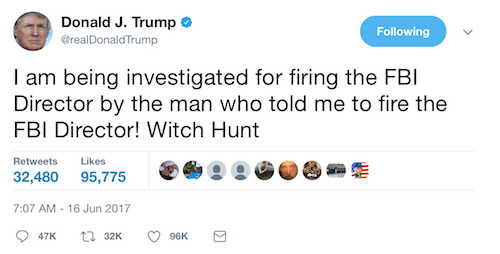One of the most useful skills a modern person can possess is knowing how to properly assign blame. In my experience, the modern person makes a lot of mistakes. Whether putting diesel in our gasoline cars or electing a sub-literate game show host to the presidency, we are not always not fucking up. Improved competence is impossible, though, so the only solution is to get better at casting blame. The Russians made Donald Trump president. The diesel pump is too close to the regular. See how great that is? This way, we can keep treating other people’s mistakes as unconscionable while continuing to make our own. Today is Friday, and that is absolutely not my fault. Won’t you spread the blame around with me?
Tag Archives: investigation
Trumps explore limits of nepotism
They’re a bunch of hardasses over at the New Yorker, where coverage of Donald Trump, Jr. renders the possessive of his name with a period-comma-apostrophe-s. For example: Donald Trump Jr.,’s Love for Russian Dirt. That’s some strict copy editing, right there. No one is eyeballing it at the New Yorker. Probably, the way they maintain such high standards is by hiring the old copy editor’s son. It just makes sense. Once a guy has spent his whole career editing copy, practicing at the highest level until he knows every page of the stylebook, the second-best copy editor in the world has got to be his kid. Being good at stuff is hereditary. That’s why the world is ruled by kings.
Anywhom, Donald Trump Jr.’s emails tested the limits of this principle when he released them on Twitter this morning. He seems to have published them in an attempt to scoop the New York Times, which reported today that Trump Jr. expressed interest in damaging information about Hillary Clinton that was explicitly provided by the Russian government. Here is an actual email exchange between “Kremlin-connected Russian lawyer” Natalia Veselnitskaya and Trump Jr. that I am not making up:
Veselnitskaya: This is obviously very high level and sensitive information but is part of Russia and its government’s support for Mr. Trump.
Trump: If it’s what you say I love it especially later in the summer.
Kids: When someone asks you if you want sensitive information from a foreign government to help your political campaign, you say, “Are you a cop?” They have to tell you if you ask. I don’t know how this exchange could be more explicit. If you were writing a comedy sketch where Donald Trump, Jr. gets caught in a DOJ sting, you could use this wording. Trump surrogates have argued that the meeting that came from these emails turned out to be about Russian adoption policies, and Veselnitskaya offered “very high level and sensitive information” as a false pretext. That would explain her wording. If you had such information, would you ever say so in an email? But Trump Jr. literally goes on record as loving this illegal plan, bringing to his role in his father’s presidential campaign less discretion than one brings to a weed deal on Facebook.
It’s almost as though he attained his position by favoritism. There’s something gross about the way President Trump gives important jobs to his children. It’s un-American. A founding principle of our government is that it will be run by people who have earned it, or at least won a popularity contest. Getting born into it was the old way, the collapsing system that took Europe down with it. Maybe I’m just mad because my dad isn’t president. But if Trump had hired an experienced campaign operative to do Donald Jr.’s job, I bet they wouldn’t have sent this email. They might still have colluded with Russia to influence the election, whatever that means. But they wouldn’t have embarrassed the whole country doing it.
73 year-old man “lands in coma” after “encounter” with Missoula police
Last month, Missoula police responded to a complaint that a man on Higgins Avenue was shining a flashlight in the eyes of passing drivers. That man was 73 year-old James Smith. Commuters may know him as the guy who sits in his yard with a heart-shaped box during rush hour. According to police affidavits, Smith hit two officers with his flashlight when they arrived at his home on May 20. After he was detained, he tried to kick and trip them. Two days later, his daughter got a call informing her that he was in a coma. Here’s Dylan Kato at the Missoulian:
Stephanie Smith, of Allentown, Pennsylvania, said that in addition to the coma, her father sustained a skull fracture, multiple facial fractures, a concussion, respiratory failure, bruised ribs, organ damage, bruising and other injuries from the incident. While he was sometimes confused or disoriented before the incident, Smith said these symptoms, as well as amnesia, have become more prominent since he was hospitalized.
What happened between when Smith was arrested and when he was hospitalized with multiple head traumas is not stated. Who can say what put this 73 year-old man in a coma? It’s a stone-cold whodunnit, as far as the Missoulian is concerned.
The reticence starts with the headline: “State investigates Missoula police after encounter lands 73-year-old man in coma.” Whatever happened was not a beating or even an arrest. It was an encounter, and it “landed” Smith in a coma the same way Bugs Bunny’s hijinks land him in trouble. “Lands” is an odd choice of verb that reflects this headline’s desire to allege as little as possible. The pathological refusal to say anyone did anything continues in the opening paragraphs:
The Montana Department of Justice is conducting a use-of-force review after an incident involving the Missoula Police Department in May ended with a 73-year-old man hospitalized in a coma. James Smith spent several days in Providence St. Patrick Hospital before he was committed involuntarily to the Montana State Hospital in Warm Springs. He was released to his daughter following a court hearing May 30.
That doesn’t even say who released him, much less how he got into that coma. It was an “incident involving the Missoula Police Department,” and it “ended” with Smith near death, but beyond that we cannot say. Maybe he fell down the stairs ten times before a metal press closed on his head.
Kato has a good reason to write this way. The matter is still under investigation, and a newspaper must be careful never to blame people for things they might not have done. The passive voice is a way to maintain a scrupulous objectivity. But it can also disconnect the facts of a story so thoroughly as to distort it. When Markus Kaarma was charged with murder after shooting a teenager in his garage, the Missoulian did not report that an incident involving him ended with a 17 year-old exchange student bleeding to death. We reserve such conspicuously softened language for the police.
Reporting potential instances of police brutality as vague situations that just happened is an industry-wide habit. It reflects a journalism that has become too deferential to police. On the cops-and-crime beat, the prohibition against attributing fault to cops is so powerful as to outweigh the prohibition against the passive voice, leading otherwise strong writers into paragraphs like this:
Missoula police Detective Capt. Mike Colyer said on May 24 that he was called to the scene shortly after 2:30 a.m. on May 20. He confirmed that Smith had been hospitalized after being detained, and that due to the potential use-of-force issue, the department followed best practices and asked the Justice Department’s Division of Criminal Investigation to conduct an independent review.
Smith has been hospitalized and detained, but for what and by whom go unstated. The injuries that put him in a coma are a “potential use-of-force issue,” reinforcing the vagueness of the passive voice with some old-fashioned Orwellian euphemism. One of the paragraph’s only active verbs pops up to shine a favorable light on the police department, which “followed best practices” by asking for an independent review [of how two of its officers put an elderly man in a coma.]
I want to emphasize that this style of writing is not Kato’s invention or even his choice. He’s following standard practices in daily news reporting, and wisely so. He’s working with limited information, and he doesn’t want to smear two good cops if there is somehow an innocent explanation for all this. Neither does he want to get his paper sued. He’s got editors combing his copy to make sure that doesn’t happen, while on the other end he’s got to worry about access. If cops think he wrote a hit piece on other cops, his job as a reporter gets a lot harder. I don’t want to blame Kato for having to work under these pressures. But I do want to draw attention to the system that pressures him, and the way news reporting bends over backwards to say nothing critical of the police.
Maybe it’s not just reporters, though. Perhaps the most heartbreaking part of this story comes at the end, when Kato paraphrases Smith’s daughter and her husband:
They reinforced that they appreciate the help they have received from the police department, as well as lawyers in the Missoula County Attorney’s Office and the Office of the State Public Defender, since they arrived in Missoula. “The people that we dealt with are very nice, including the detective and evidence people. Over all this we do support law enforcement, we understand that they put their lives in harm’s way,” Jones said.
It does look like they almost beat her father to death, though. I was going to say that we give police too much deference. We heap praise on them whenever they become vulnerable to criticism, so that the more evidently awful things they do, the more we announce our support. That was going to be my conclusion. But if this woman doesn’t agree, who would?
Trump on Twitter: I am being investigated
I’ve spent the last several hours writing blurbs for the Indy’s upcoming Best of Missoula issue, and boy are my arms…glib. Remember yesterday, when I said there would be Friday links? I’ve got some bad news, champ. Fortunately for us, the president is refreshing the news cycle so rapidly there’s no time to look back on the week that was. This morning, he took to Twitter for this quasi-official statement:
I worry that the bizarre content of this tweet will distract from the bizarre punctuation. The president who has spent the last few weeks trying to get various members of the Department of Justice to say that he is not being investigated is, apparently, being investigated. While attempting to defend himself, he became the first person to reveal that publicly. He also thinks Witch Hunt is a title, like Duck Hunt.
This behavior is very much like that of a character in comedy. First he becomes monomaniacally dedicated to a goal—in this case, getting the word out that he is not under investigation. Then his efforts to pursue that goal bring about the opposite result—in this case, telling the world that he is under investigation. It’s times like this I’m glad there’s nothing funny about his speech patterns, or the president would seem ridiculous.
Or perhaps this is a genius gambit! Maybe, at the moment when it most appears that Trump doesn’t want people to think he is being investigated, he tells everyone he is being investigated to deprive his enemies of the opportunity to tell us themselves. It is a plan fiendish in its intricacies. Surely it is the work of a mastermind—the kind of mastermind who uses his inherited wealth to rise to the presidency and then, like a phoenix, fails at literally everything else he attempts. You’ve fooled us again, President Trump. We almost thought you were incompetent, for a second.
Professor’s essay provokes series of Title IX complaints
Three months ago, Laura Kipnis wrote an essay for the Chronicle of Higher Education called Sexual Paranoia Strikes Academe. In it, she argues that Northwestern’s new policy forbidding professors from dating undergraduates presumes young adults are powerless before the charismatic and institutional powers of teachers—presumes it in a way that encourages students to think of themselves as powerless, too. Quote:
It’s the fiction of the all-powerful professor embedded in the new campus codes that appalls me. And the kowtowing to the fiction—kowtowing wrapped in a vaguely feminist air of rectitude. If this is feminism, it’s feminism hijacked by melodrama. The melodramatic imagination’s obsession with helpless victims and powerful predators is what’s shaping the conversation of the moment, to the detriment of those whose interests are supposedly being protected, namely students. The result? Students’ sense of vulnerability is skyrocketing.
She also describes, in vague terms, recent allegations against fellow Northwestern professor Peter Ludlow. Shortly thereafter, two Northwestern graduate students filed their own Title IX complaints against her, saying the essay constituted “retaliation” and discouraged victims of sexual misconduct from coming forward. A subsequent investigation cleared her of wrongdoing.






